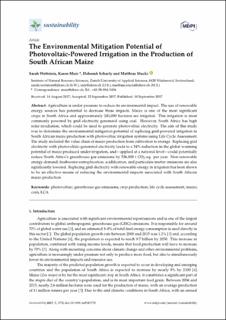Bitte benutzen Sie diese Kennung, um auf die Ressource zu verweisen:
https://doi.org/10.21256/zhaw-1361| Publikationstyp: | Beitrag in wissenschaftlicher Zeitschrift |
| Art der Begutachtung: | Peer review (Publikation) |
| Titel: | The environmental mitigation potential of photovoltaic-powered irrigation in the production of South African maize |
| Autor/-in: | Wettstein, Sarah Muir, Karen Scharfy, Deborah Stucki, Matthias |
| DOI: | 10.21256/zhaw-1361 10.3390/su9101772 |
| Erschienen in: | Sustainability |
| Band(Heft): | 9 |
| Heft: | 1772 |
| Erscheinungsdatum: | 30-Sep-2017 |
| Verlag / Hrsg. Institution: | MDPI |
| ISSN: | 2071-1050 |
| Sprache: | Englisch |
| Schlagwörter: | Photovoltaic; Greenhouse gas emissions; Crop production; Life-cycle assessment; Maize; Corn; LCA |
| Fachgebiet (DDC): | 333.79: Energie |
| Zusammenfassung: | Agriculture is under pressure to reduce its environmental impact. The use of renewable energy sources has potential to decrease these impacts. Maize is one of the most significant crops in South Africa and approximately 241,000 hectares are irrigated. This irrigation is most commonly powered by grid electricity generated using coal. However, South Africa has high solar irradiation, which could be used to generate photovoltaic electricity. The aim of this study was to determine the environmental mitigation potential of replacing grid-powered irrigation in South African maize production with photovoltaic irrigation systems using Life Cycle Assessment. The study included the value chain of maize production from cultivation to storage. Replacing grid electricity with photovoltaic-generated electricity leads to a 34% reduction in the global warming potential of maize produced under irrigation, and – applied at a national level – could potentially reduce South Africa’s greenhouse gas emissions by 536,000 t CO2-eq. per year. Non-renewable energy demand, freshwater eutrophication, acidification, and particulate matter emissions are also significantly lowered. Replacing grid electricity with renewable energy in irrigation has been shown to be an effective means of reducing the environmental impacts associated with South African maize production. |
| URI: | https://digitalcollection.zhaw.ch/handle/11475/1406 |
| Volltext Version: | Publizierte Version |
| Lizenz (gemäss Verlagsvertrag): | CC BY 4.0: Namensnennung 4.0 International |
| Departement: | Life Sciences und Facility Management |
| Organisationseinheit: | Institut für Umwelt und Natürliche Ressourcen (IUNR) |
| Enthalten in den Sammlungen: | Publikationen Life Sciences und Facility Management |
Dateien zu dieser Ressource:
| Datei | Beschreibung | Größe | Format | |
|---|---|---|---|---|
| sustainability-09-01772-v2.pdf | Wettstein et al. 2017 The Environmental Mitigation Potential of Photovoltaic-Powered Irrigation in the Production of South African Maize | 964.49 kB | Adobe PDF |  Öffnen/Anzeigen |
Zur Langanzeige
Wettstein, S., Muir, K., Scharfy, D., & Stucki, M. (2017). The environmental mitigation potential of photovoltaic-powered irrigation in the production of South African maize. Sustainability, 9(1772). https://doi.org/10.21256/zhaw-1361
Wettstein, S. et al. (2017) ‘The environmental mitigation potential of photovoltaic-powered irrigation in the production of South African maize’, Sustainability, 9(1772). Available at: https://doi.org/10.21256/zhaw-1361.
S. Wettstein, K. Muir, D. Scharfy, and M. Stucki, “The environmental mitigation potential of photovoltaic-powered irrigation in the production of South African maize,” Sustainability, vol. 9, no. 1772, Sep. 2017, doi: 10.21256/zhaw-1361.
WETTSTEIN, Sarah, Karen MUIR, Deborah SCHARFY und Matthias STUCKI, 2017. The environmental mitigation potential of photovoltaic-powered irrigation in the production of South African maize. Sustainability. 30 September 2017. Bd. 9, Nr. 1772. DOI 10.21256/zhaw-1361
Wettstein, Sarah, Karen Muir, Deborah Scharfy, and Matthias Stucki. 2017. “The Environmental Mitigation Potential of Photovoltaic-Powered Irrigation in the Production of South African Maize.” Sustainability 9 (1772). https://doi.org/10.21256/zhaw-1361.
Wettstein, Sarah, et al. “The Environmental Mitigation Potential of Photovoltaic-Powered Irrigation in the Production of South African Maize.” Sustainability, vol. 9, no. 1772, Sept. 2017, https://doi.org/10.21256/zhaw-1361.
Alle Ressourcen in diesem Repository sind urheberrechtlich geschützt, soweit nicht anderweitig angezeigt.